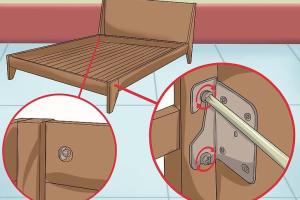Mastering Silence: Ultimate Guide to Fixing Your Squeaking Bed Frame

-
Quick Links:
- Understanding the Squeaks
- Common Causes of a Squeaking Bed Frame
- Tools and Materials Needed
- Step-by-Step Guide to Fixing Squeaks
- Preventative Measures for a Quiet Bed
- Case Studies and Real-Life Examples
- Expert Insights and Tips
- FAQs
Understanding the Squeaks
Squeaking bed frames can be an annoyance that disrupts your sleep and peace of mind. It is essential to understand why your bed frame squeaks to effectively address the issue. The sound can be indicative of various problems ranging from loose parts to structural flaws.
Common Causes of a Squeaking Bed Frame
1. Loose Screws and Bolts
Over time, the screws and bolts that hold your bed frame together can loosen, leading to movement and squeaking sounds. This is the most common cause of bed frame noise.
2. Worn Out Joints
Joints in the bed frame, especially in wooden frames, can wear down, causing friction and noise when weight is applied.
3. Mattress Movement
If your mattress is sliding on the bed frame, it can create noise as it shifts during movement, especially in larger beds.
4. Material Expansion and Contraction
Wooden frames can expand or contract with changes in temperature and humidity, creating gaps that lead to squeaking.
Tools and Materials Needed
- Screwdriver (Flathead and Phillips)
- Wrench
- Wood glue (for wooden frames)
- Lubricant (e.g., WD-40, silicone spray)
- Wooden shim (for tightening joints)
- Rug or furniture pads (to place under the legs)
Step-by-Step Guide to Fixing Squeaks
Follow this detailed guide to identify and fix the squeaks in your bed frame effectively.
Step 1: Identify the Source of the Squeak
Start by determining where the noise is coming from. You can do this by moving around on the bed and listening closely. Pay attention to joints, screws, and the mattress itself.
Step 2: Tighten Loose Screws and Bolts
Use a screwdriver or wrench to tighten any loose screws and bolts. Make sure not to overtighten, as this can strip the wood or metal.
Step 3: Apply Lubrication
Spray lubricant on the joints and anywhere you hear squeaking. This helps to reduce friction and noise. Ensure you wipe off excess lubricant to avoid any slippage.
Step 4: Inspect for Worn Out Joints
If you find any joints that appear worn, apply wood glue to them and clamp until dry. You may also consider replacing the joint if necessary.
Step 5: Prevent Mattress Movement
To stop your mattress from sliding, add a non-slip mattress pad or place rubber mats under the mattress. This will help it stay in place and reduce movement-related squeaks.
Step 6: Use Wooden Shims
If there are gaps in the frame, insert wooden shims to stabilize the structure and eliminate movement that causes noise.
Step 7: Add Furniture Pads
Placing furniture pads under the legs of the bed can also help absorb sound and prevent squeaking due to floor movement.
Preventative Measures for a Quiet Bed
To avoid future squeaks, regularly check the screws and bolts on your bed frame. You can also periodically lubricate the joints to ensure they remain quiet.
Case Studies and Real-Life Examples
Case Study 1: The Wooden Frame
John, a homeowner, experienced persistent squeaks from his wooden bed frame. After following the steps to tighten screws and apply wood glue, he noted a significant improvement in noise levels.
Case Study 2: The Metal Frame
Lisa had a metal bed frame that squeaked every time she moved. By applying a silicone spray to the joints and placing furniture pads under the legs, she eliminated the noise entirely.
Expert Insights and Tips
Experts recommend conducting a routine inspection of your bed frame every few months to ensure all parts are secure. Additionally, investing in a quality bed frame can reduce the risk of squeaking.
FAQs
1. Why does my bed frame squeak?
Squeaks can be caused by loose screws, worn joints, or mattress movement.
2. How can I stop my mattress from sliding?
Use a non-slip mattress pad or rubber mats to keep your mattress in place.
3. Can I use oil instead of lubricant?
It's best to use a silicone-based lubricant as oil can attract dust and dirt.
4. How often should I check my bed frame?
Every few months is recommended to maintain it effectively.
5. What if tightening screws doesn't work?
You may need to inspect joints or consider replacing worn parts.
6. Can I fix my bed frame without professional help?
Yes, most fixes can be done with basic tools and a little time.
7. Is squeaking a sign of a bigger problem?
It can indicate loose parts or deterioration, but it's not always serious.
8. Can furniture pads really help?
Yes, they can absorb sound and prevent squeaks caused by floor movement.
9. What type of lubricant should I use?
A silicone spray or similar lubricant is effective for bed frames.
10. How can I prevent squeaks in the future?
Regular maintenance, including tightening screws and lubricating joints, can help.
By following this comprehensive guide, you can effectively address and prevent squeaking in your bed frame, ensuring a peaceful night's sleep.
For more insights and information on home improvement, check out the following resources:
- Better Homes and Gardens: Fix a Squeaky Bed Frame
- HGTV: Repair a Squeaky Bed
- The Spruce: How to Fix a Squeaky Bed
Random Reads